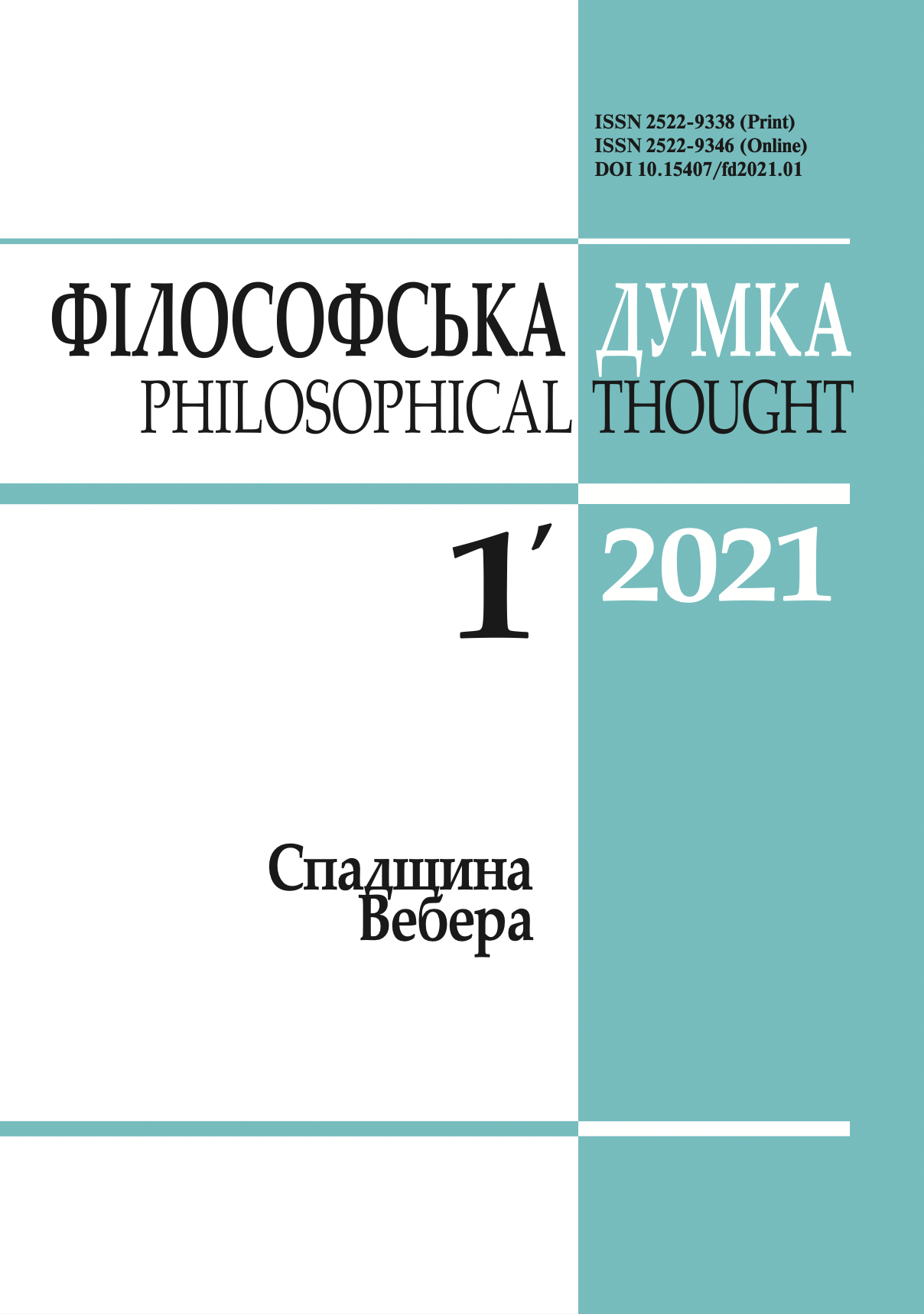Max Weber and the Modern Plebiscitary Democracy
Weber's legacy: at the crossroads of traditions
DOI:
https://doi.org/10.15407/fd2021.01.135Keywords:
Max Weber, democracy, plebiscitary leader, legitimacy, plebisciteAbstract
The paper offers an interpretation of one of the most controversial concepts of Max Weber: the plebiscitary leader democracy (Führerdemokratie). In particular, it considers Weber’s views on the role of parliament and his assessment of democracy. The question of why the types of legitimate domination do not include democratic legitimacy is discussed, and the author also shows the connection between the conception of plebiscitary democracy and Weber’s theory of bureaucracy.
The presentation is not limited to the historical and philosophical analysis of Weber’s views. The main goal of the article is to show how the scientist’s ideas have again become relevant in modern politics. Weber’s concept of plebiscitary democracy is applicable both to analyzing the distortion caused by the crisis of traditional party politics in established democracies and to describing modern personalistic regimes, the legitimacy of which popular elections of a na- tional leader confirm.
References
Beetham, D. (1987). Beaurocracy. Minneapolis: University of Minnesota Press.
Breuer, S. (1998). The Concept of Democracy in Weber's Political Sociology. In: R. Schroeder (Ed.). Max Weber, Democracy and Modernization (pp. 1-13). Basingstoke: Macmillan.
https://doi.org/10.1007/978-1-349-26836-8_1
PMid:9546111
de Beus, J. (2011). Audience Democracy: An Emerging Pattern in Postmodern Political Commu- nication. In: K. Brants, K. Voltmer (Eds.). Political Communication in Postmodern Democracy. London: Palgrave, Macmillan.
https://doi.org/10.1057/9780230294783_2
Dalton, R. J. (2004). Democratic Challenges, Democratic Choices: The Erosion of Political Support in Advanced Industrial Democracies. Oxford: Oxford University Press.
https://doi.org/10.1093/acprof:oso/9780199268436.001.0001
Eliaeson, S. (1991). Between Ratio and Charisma - Max Weber's Views on Plebiscitary Leadership Democracy. Statsvetenskaplig Tidskrift, 94, 317-339.
Colin Hay, C. (2007). Why We Hate Politics. Cambridge: Polity Press.
Green, J. E. (2010). The Eyes of the People: Democracy in an Age of Spectatorship. Oxford, England: Oxford University Press.
Körösényi, A. (2019). The Theory and Practice of Plebiscitary Leadership: Weber and the Orbánregime. East European Politics and Societies: and Cultures, 33 (2), 280-301.
https://doi.org/10.1177/0888325418796929
Loewenstein, K. (1961). Max Weber als «Ahnherr» des plebiszitären Führerstaates. Kölner Zeitschrift für Soziologie und Sozialpsychologie, 13, 275-89.
Mair, P. (2013). Ruling the Void: The Hollowing of Western Democracy. New York: Verso. Maley, T. (2011). Democracy and the Political in Max Weber's Thought. Toronto: University of Toronto Press.
Mandel, D. (2005). "Managed democracy": Capital and state in Russia. Debatte: Journal of Contemporary Central and Eastern Europe, 13 (2), 117-136.
https://doi.org/10.1080/09651560500306762
Manin, B. (1997). The Principles of Representative Government. Cambridge: Cambridge University Press.
https://doi.org/10.1017/CBO9780511659935
Mommsen, W. (1984). Max Weber and German Politics, 1890-1920. Chicago: The University of Chicago Press.
Mommsen, W. (1989). The Political and Social Theory of Max Weber. Chicago: The University of Chicago Press.
Rogov, K. (2015). Triumphs and Crises of Plebiscitary Presidentialism. In: L. Aron (Ed.). Putin's Russia: How It Rose, How It Is Maintained, and How It Might End (pp. 83-105). Washington, DC: American Enterprise Institute.
Schmitt, K. (2008). Constitutional Theory (1928). Transl. and ed.: J. Seitzer. Durham: Duke Uni- versity Press.
https://doi.org/10.1215/9780822390589
Senigaglia, C. (2011). Max Weber and the parliamentary bureaucracy of his time. Parliaments, Estates and Representation, 31 (1), 53-66.
https://doi.org/10.1080/02606755.2011.560753
Senigaglia, C. (2020). Weber's Concern on Immediate Democracy and the Mediation of Parlia- ment. Redescriptions: Political Thought, Conceptual History and Feminist Theory, 23 (1), 20-35.
https://doi.org/10.33134/rds.327
Tormey, S. (2015). The End of Representative Politics. Cambridge: Polity Press.
Urbinati, N. (2014). Democracy Disfigured: Opinion, Truth, and the People. Harvard University Press.
https://doi.org/10.4159/harvard.9780674726383
Weber, M. (1917-1918). Parlament und Regierung im neugeordneten Deutschland. MWG I/15:421-596.
Weber, M. (1922) Wirtschaft und Gesellschaft. Grundriss der verstehenden Soziologie. Tübingen: Mohr.
Weber, M. (1924) Gesammelte Aufsätze zur Soziologie und Sozialpolitik. Tübingen: Mohr.
Weber, M. (1971). Gesammelte politische Schriften. Tübingen: Mohr.
Zakaria, F. (1997). The Rise of Illiberal Democracy. Foreign Affairs, 76 (6), 22-43.
Downloads
-
PDF (Українська)
Downloads: 569
Published
How to Cite
Issue
Section
License
Authors who publish with this journal agree to the following terms:
- Authors retain copyright and grant the journal right of first publication.
- Authors are able to enter into separate, additional contractual arrangements for the non-exclusive distribution of the journal's published version of the work (e.g., post it to an institutional repository or publish it in a book), with an acknowledgement of its initial publication in this journal.
- Authors are permitted and encouraged to post their work online (e.g., in institutional repositories or on their website) prior to and during the submission process, as it can lead to productive exchanges, as well as earlier and greater citation of published work (See The Effect of Open Access).


